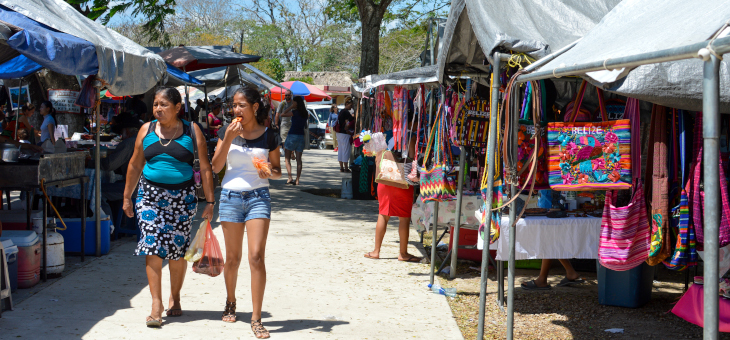Belize: Tiny country likely to fall in most severe recession in its history due to covid-19 pandemic

Unprecedented economic recession in the cards
Belize has experienced sluggish growth for already more than a decade. Economic growth has been weak mainly due to diseases affecting agriculture and fishery, together with lower government spending compared to the historical average. The covid-19 pandemic is expected to push the economy in an unprecedented, heavy recession. Indeed, the stop in global tourism and relatively low food prices are expected to push the tourism-reliant economy into a recession of 12% in 2020. This is a huge shock even compared to the region, which is expected to contract by 5% this year, the largest contraction since the 1930 Great Depression. Assuming that the covid-19 pandemic wanes, a recovery of 7.6% is in the cards for 2021 supported by higher tourism revenues, mainly from the US, and by a stable level of remittances. The latter assumption is, however, endangered by Trump’s toughening immigration stance in the run-up to the US presidential election in November.

Elections in November, if not delayed
Prime Minister Dean Barrow of the United Democratic Party (UDP) assumed office in 2008 and is completing his last term. After calling for a snap election in 2015, the prime minister was able to maintain his party’s parliamentary majority, strengthening his position to facilitate passing his legislative agenda. Elections are due in November 2020 but may be delayed due to the covid-19 pandemic. The tiny country’s major political issues include corruption, violent crime, a territorial dispute with Guatemala, the uncertain future of offshore oil drilling and its unsustainable government debt. Between 2009 and 2013, several public utilities were nationalised. Ever since, the government under Prime Minister Barrow pledged to avoid future expropriations and to attract more foreign investments in infrastructure and public services. Still FDI inflows remained particularly volatile.
Pressure on the currency peg
The current account displays structural annual deficits of about 9% of GDP on average, financed by government lending, foreign exchange reserves and volatile FDI inflows. The covid-19 pandemic is projected to lead to a serious drop in tourism revenues (accounting for half of current account receipts) and to lower food prices (accounting for almost 40% of current account receipts). Hence – as Belize is a net oil importer – low oil prices will not result in a lower current account deficit. On the contrary, a huge current account deficit of 18% of GDP can be expected in 2020. Compared to the region, Belize is forecasted to be one of the worst performing countries (see graph 2). As, in general, FDI are falling due to the covid-19 pandemic, external debt and foreign exchange reserves will likely be needed to close the financing gap. As financial markets today are in general rather risk-averse towards Latin American countries, foreign exchange reserves are likely to bear most of the burden. Hence, the foreign exchange reserves – standing at 3 months of import cover in February 2020 – are likely to erode, which will put pressure on the US dollar peg. Since 1976, the Belize dollar has been pegged to the US dollar, the intervention currency, at the rate of BZD 2 per USD 1. As a result, the country has enjoyed rather low inflation of around 1-2% in the past. However, large external shocks as witnessed today can result in foreign exchange shortages or capital controls. Indeed, if a peg is being defended with an inadequate level of foreign exchange reserves while financing is drying up, these scenarios are a real possibility. That being said, financial assistance form multilateral institutions such as the IMF will probably avoid a balance of payment crisis.

Recent history of serial sovereign debt defaults and covid-19 put public finances in a difficult spot
Public finances are strained. Following episodes of higher fiscal deficits and legal claims on past nationalisations, the public debt stock accrued up to an anticipated 95% of GDP by the end of 2016. Belize defaulted on bond repayments in 2017 leading to its third debt renegotiation in merely a decade following earlier defaults in 2006-07 and in 2012-13. Despite debt rescheduling and fiscal consolidation, public debt remained around the same level before the covid-19 pandemic hit. A wide fiscal deficit of 5.7% of GDP is in the cards in 2020 due to stimulus packages and lower tax revenues. The fiscal deficit in combination with the severe contraction of the economy could push public debt above 110% of GDP, a very high level for the country. On top of that, financial markets are currently rather risk-averse towards Latin American countries. Moreover, due to its defaulting history, Belize is very unlikely to obtain accommodative credit terms again from international lenders. Therefore, the sovereign is exposed to significant refinancing risks. Moreover, some important downside risks loom. First, the government still faces various legal claims of former owners of nationalised companies (estimated at 6% of GDP in 2019) which could raise public financing needs to a level that might be difficult to meet. Moreover, the proportion of public debt held externally reaches up to nearly 70% of GDP. The drop in foreign exchange reserves risks a dollar peg devaluation and additional bloating of the public external debt burden.
ST political risk rating downgraded while MLT political risk rating remains stable for now
The large current account deficit in 2020, in combination with the rather low and falling foreign exchange reserves for a pegged country, has led Credendo to downgrade Belize’s short-term political risk rating by two notches to category 5/7. The medium- to long-term political risk rating remains stable in category 6/7 for now. Nonetheless, many downside risks loom such as a prolonged covid-19 pandemic or a severe hit of a natural disaster (like a hurricane or drought) as the country is vulnerable to climate shocks.
Analyst: Jolyn Debuysscher – J.Debuysscher@credendo.com